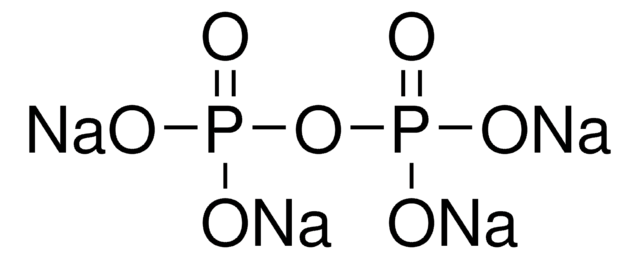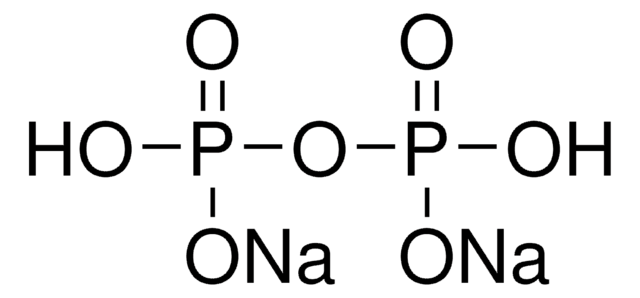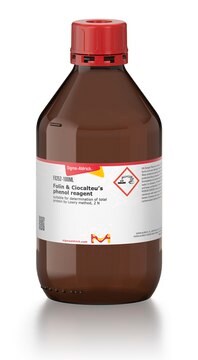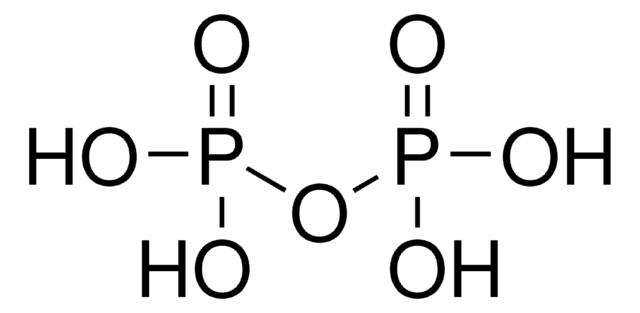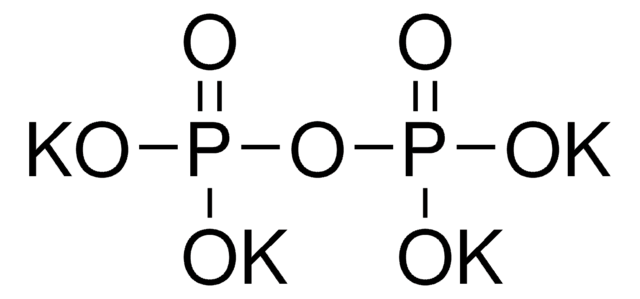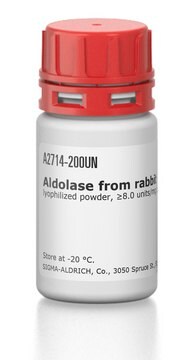P7275
Pyrophosphate reagent
spectrophotometric assay
Synonyme(s) :
Pyrophosphate detection reagent
Se connecterpour consulter vos tarifs contractuels et ceux de votre entreprise/organisme
About This Item
Code UNSPSC :
12352204
Nomenclature NACRES :
NA.54
Produits recommandés
Niveau de qualité
Forme
powder
Utilisation
vial sufficient for ≤4 assays
Température de stockage
−20°C
Catégories apparentées
Application
The product has been used for the measurement of pyrophosphate content of plant tissues. It has also been used as a rapid, routine check of pyrophosphate content by monitoring NADH oxidation in Solanum tuberosum tuber extracts.
Actions biochimiques/physiologiques
The pyrophosphate detection kit couples the production of pyrophosphate to the consumption of NADH.
Conditionnement
A technical bulletin is included.
Composants
ComponentConcentration
Imidazole × HCl, pH 7.4 45 mM
Citrate 5 mM
EDTA 0.10 mM
Mg2+, Mn2+, Co2+ 2 mM, 0.2 mM, 0.02 mM
β-NADH 0.8 mM
F-6-P 12 mM
Bovine Serum Albumin 5 mg/mL
Sugar Stabilizer 5 mg/mL
PPi-PFK 0.5 units/mL
Aldolase 7.5 units/mL
GDH 5 units/mL
TPI 50 units/mL
Imidazole × HCl, pH 7.4 45 mM
Citrate 5 mM
EDTA 0.10 mM
Mg2+, Mn2+, Co2+ 2 mM, 0.2 mM, 0.02 mM
β-NADH 0.8 mM
F-6-P 12 mM
Bovine Serum Albumin 5 mg/mL
Sugar Stabilizer 5 mg/mL
PPi-PFK 0.5 units/mL
Aldolase 7.5 units/mL
GDH 5 units/mL
TPI 50 units/mL
Qualité
A coupled enzyme system containing fructose-6-phosphate kinase (pyrophosphate-dependent), aldolase, triosephosphate isomerase, and α-glycerophosphate dehydrogenase.
Principe
Two moles of NADH are oxidized to NAD+ per mole of pyrophosphate consumed. The reaction is monitored spectrophotometrically at 340 nm.
The reagent can be used to detect 10-100 nmoles of pyrophosphate.
The reagent can be used to detect 10-100 nmoles of pyrophosphate.
Notes préparatoires
Dissolve the contents of one vial of Pyrophosphate Reagent in 4.0 mL of water.
Code de la classe de stockage
11 - Combustible Solids
Classe de danger pour l'eau (WGK)
WGK 3
Point d'éclair (°F)
Not applicable
Point d'éclair (°C)
Not applicable
Équipement de protection individuelle
Eyeshields, Gloves, type N95 (US)
Certificats d'analyse (COA)
Recherchez un Certificats d'analyse (COA) en saisissant le numéro de lot du produit. Les numéros de lot figurent sur l'étiquette du produit après les mots "Lot" ou "Batch".
Déjà en possession de ce produit ?
Retrouvez la documentation relative aux produits que vous avez récemment achetés dans la Bibliothèque de documents.
Les clients ont également consulté
Devin W Cochrane et al.
Plant science : an international journal of experimental plant biology, 265, 124-130 (2017-12-11)
Class 1 plant hemoglobins (phytoglobins) are upregulated during low-oxygen stress and participate in metabolism and cell signaling via modulation of the levels of nitric oxide (NO). We studied the effects of overexpression and knockdown of the class 1 phytoglobin gene
R Viola et al.
Plant physiology, 97(2), 638-643 (1991-10-01)
Pretreatment of discs excised from developing tubers of potato (Solanum tuberosum L.) with 10 millimolar sodium fluoride induced a transient increase in 3-phosphoglycerate content. This was followed by increases in triose-phosphate, fructose 1,6-bisphosphate and hexose-phosphate (glucose 6-phosphate + fructose 6-phosphate
Erick Strauss et al.
The Journal of biological chemistry, 277(50), 48205-48209 (2002-10-10)
Pantothenic acid (vitamin B(5)) is the natural precursor of coenzyme A (CoA), an essential cofactor in all organisms. The pantothenic acid antimetabolite N-pentylpantothenamide inhibits the growth of Escherichia coli with a minimum inhibitory concentration of 2 microm. In this study
A continuous spectrophotometric assay for argininosuccinate synthetase based on pyrophosphate formation.
W E O'Brien
Analytical biochemistry, 76(2), 423-430 (1976-12-01)
D A Smyth et al.
Plant physiology, 75(3), 862-864 (1984-07-01)
Pyrophosphate (PPi) was measured in pea (Pisum sativum L.) and corn (Zea mays L.) tissues by using an enzymic method based on PPi-dependent phosphofructokinase (PPi-PFK). Different organs of pea and corn seedlings were extracted to determine if PPi is present
Notre équipe de scientifiques dispose d'une expérience dans tous les secteurs de la recherche, notamment en sciences de la vie, science des matériaux, synthèse chimique, chromatographie, analyse et dans de nombreux autres domaines..
Contacter notre Service technique
